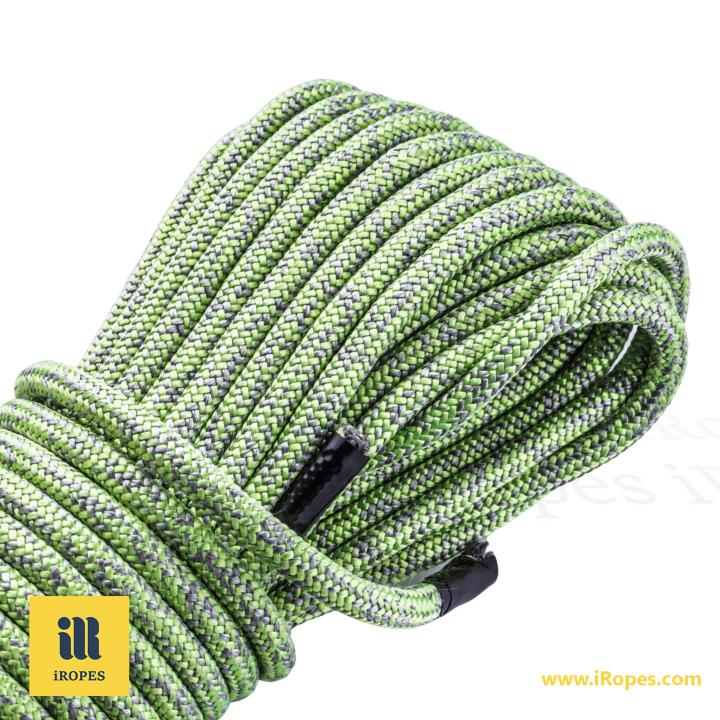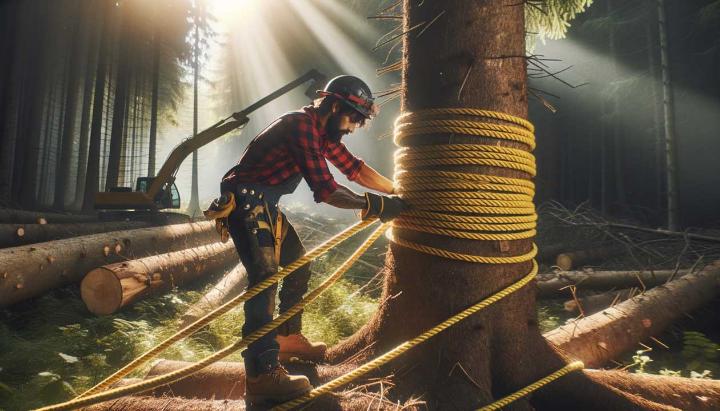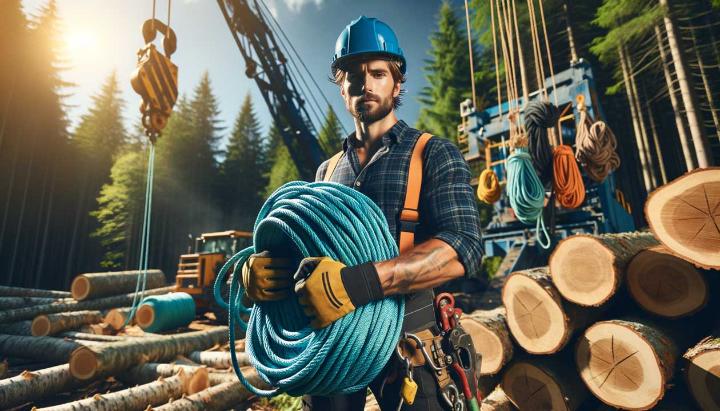Have you ever wondered why some forestry professionals swear by nylon cord rope while others are experimenting with cutting-edge materials like Kevlar? In the high-stakes world of tree work, choosing the right rope can mean the difference between a successful operation and a potential disaster. Today, we're diving into the top benefits of using nylon cord rope in forestry, and exploring how iRopes, a leading manufacturer, is revolutionising the industry with their diverse range of high-performance ropes.
From the dense rainforests of Queensland to the towering eucalypts of Victoria, forestry work demands ropes that can withstand extreme conditions. Nylon cord rope has long been a favourite among arborists and loggers, thanks to its impressive strength-to-weight ratio and versatility. But what makes it stand out in a field where innovation is constant?
In this post, we'll unpack the unique advantages of nylon forestry rope, compare it to other materials like Dyneema, Kevlar, Technora, and Vectran, and show you why iRopes' commitment to quality and customisation is setting new standards in the industry. Whether you're a seasoned professional or just starting in forestry, understanding these ropes could be the key to elevating your work to new heights – quite literally!
Nylon Cord Rope: The Ideal Choice for Forestry Applications
When it comes to forestry work, choosing the right rope can make all the difference. As an arborist with over a decade of experience, I've seen firsthand how crucial it is to have reliable equipment. That's why I'm excited to share with you the exceptional benefits of nylon cord rope in forestry applications.
Advantages of Nylon Rope in Tree Work
Nylon cord rope has become a go-to choice for many forestry professionals, and for good reason. Its unique properties make it particularly well-suited for the demanding conditions of tree work.
- Impressive strength-to-weight ratio: Nylon rope offers robust strength without the bulk, making it easier to carry and manoeuvre in tricky tree-top situations.
- Excellent resistance to UV, chemicals, and abrasion: This durability ensures your rope can withstand harsh outdoor conditions and frequent use.
- Beneficial elasticity: The slight stretch in nylon rope can absorb shock loads, reducing the risk of sudden breaks during rigging operations.

Comparing Nylon to Other Forestry Ropes
While nylon excels in many areas, it's important to understand how it compares to other rope materials used in forestry:
- Nylon vs. Polyester: Nylon offers more stretch, which can be advantageous for dynamic loads, while polyester maintains a more static line.
- Static ropes: These low-stretch ropes are ideal for stability in climbing and positioning work.
- Steel wire ropes: While incredibly strong, steel ropes are much heavier and less flexible than nylon alternatives.
In my experience, nylon cord rope strikes an excellent balance for most forestry tasks. Its versatility shines in various applications, from rigging to climbing support. However, always assess your specific needs and consult with experts to determine the best rope for each task.
Remember, proper rope selection and regular inspection are crucial for safety in forestry work. Always follow industry guidelines and manufacturer recommendations.
Have you used nylon cord rope in your forestry work? I'd love to hear about your experiences and how it has impacted your operations. Share your thoughts in the comments below!
Benefits of Using Nylon Rope in Forestry
As an experienced forester, I've seen firsthand how the right equipment can make or break a job. When it comes to ropes, nylon cord rope has consistently proven its worth in the challenging world of forestry. Let's explore why this versatile material has become a go-to choice for tree work professionals.
Enhanced Safety for Forestry Workers
Safety is paramount in our line of work, and nylon rope offers several key advantages that help keep us out of harm's way:
- Superior shock absorption: The inherent elasticity of nylon helps cushion sudden loads, reducing the risk of rope failure during critical operations.
- High visibility options: Many nylon ropes come in bright colours, making them easier to spot in dense foliage and improving overall situational awareness.
- Excellent knot retention: Nylon's texture allows for secure knots that won't slip unexpectedly, a crucial factor when lives are on the line.

Improved Efficiency in Tree Work Operations
Time is money in forestry, and nylon rope helps us work smarter, not harder:
- Lightweight yet strong: Nylon's impressive strength-to-weight ratio means we can carry longer lengths without sacrificing durability.
- Weather-resistant properties: Unlike natural fibre ropes, nylon performs consistently in wet conditions, allowing us to work efficiently regardless of the weather.
- Versatility in applications: From rigging heavy limbs to setting up climbing systems, nylon rope adapts to various forestry tasks with ease.
Cost-effectiveness Compared to Other Rope Materials
While quality tools often come at a premium, nylon rope offers excellent value for money in forestry applications:
- Longevity in harsh conditions: Nylon's resistance to abrasion, UV radiation, and chemicals means it outlasts many alternatives, reducing replacement frequency.
- Low maintenance requirements: Unlike steel cables or natural fibre ropes, nylon doesn't require regular oiling or special storage conditions, saving time and resources.
- Multi-purpose functionality: The versatility of nylon rope often means fewer specialised ropes are needed, streamlining equipment costs.
Remember, while nylon rope offers numerous benefits, proper inspection and replacement schedules are still crucial. Always follow manufacturer guidelines and industry best practices to ensure optimal performance and safety.
Have you made the switch to nylon forestry rope in your operations? I'd love to hear about your experiences and any tips you've picked up along the way. Drop a comment below and let's continue this discussion!
iRopes: Leading Manufacturer of High-Performance Nylon Rope
As we delve deeper into the world of forestry ropes, I'm excited to introduce you to iRopes, a company that's been making waves in the industry. Based in China, iRopes has quickly become a trusted name among professionals seeking top-quality nylon cord rope for their demanding forestry applications.
Quality and Versatility of iRopes Nylon Cord Products
What sets iRopes apart is their unwavering commitment to producing high-performance synthetic fiber ropes. Their nylon cord rope, in particular, has become a favourite among arborists and forestry workers worldwide. Let me share why:
- Exceptional strength-to-weight ratio: iRopes' nylon cord combines robust strength with lightweight design, making it perfect for those long days in the treetops.
- Superior water resistance: While nylon does absorb some water, iRopes' specially treated nylon cord minimises water retention, maintaining its strength even in damp conditions.
- UV and chemical resistance: These ropes are built to withstand harsh outdoor environments, ensuring longevity and reliability in various weather conditions.

What truly impresses me about iRopes is their rigorous quality control process. Each batch of nylon rope cord undergoes extensive testing to ensure it meets or exceeds industry standards. This attention to detail gives me peace of mind when I'm 50 feet up in a Douglas fir, knowing my rope won't let me down.
Applications and Industries Served by iRopes
While we've been focusing on forestry, it's worth noting that iRopes' nylon cord rope finds applications across various industries:
- Marine: From mooring lines to sailing rigging, iRopes' products stand up to the harsh saltwater environment.
- Construction: The high strength and low stretch properties make these ropes ideal for heavy lifting and scaffolding support.
- Sports and Recreation: Rock climbers and adventure sports enthusiasts trust iRopes for their safety and performance needs.
But it doesn't stop at nylon. iRopes also produces an impressive range of other high-performance ropes, including UHMWPE (like Dyneema), Kevlar, Technora, and Vectran. Each of these materials offers unique properties suited to specific applications, from extreme strength to high heat resistance.
Did you know? Nylon rope has a shelf life of about 10 years when properly stored. However, with regular use in forestry applications, it's recommended to replace your ropes more frequently, typically every 1-2 years or sooner if signs of wear appear.
For more insights on the versatility of different rope materials, check out our comprehensive guide on nylon twine rope and explore how these high-performance products can revolutionize your forestry operations.
What's your experience with iRopes products? Have you tried their nylon cord rope in your forestry work? I'd love to hear your thoughts and compare notes on how these ropes perform in real-world conditions. Drop a comment below and let's keep the conversation going!
High-Performance Rope Materials Offered by iRopes
While nylon cord rope has proven its worth in forestry applications, iRopes doesn't stop there. As a leading manufacturer in the rope industry, they've embraced cutting-edge materials to create high-performance ropes that push the boundaries of what's possible. Let's explore some of these innovative materials and how they're changing the game for professionals across various industries.
HMPE: The Strongest Synthetic Fibers
MATERIAL: UHMWPE
CONSTRUCT: 12-strand
ELONGATION: 3%
When it comes to strength-to-weight ratio, nothing beats High Modulus Polyethylene (HMPE) fibers, with Dyneema being the most well-known brand. As someone who's worked with various rope materials, I can tell you that HMPE ropes are truly in a league of their own.
- Unparalleled strength: HMPE ropes are up to 15 times stronger than steel wire ropes of the same diameter. This means you can use thinner, lighter ropes for the same load-bearing capacity.
- Incredibly lightweight: These ropes float on water, making them ideal for marine applications where every ounce matters.
- Excellent abrasion resistance: HMPE fibers can withstand harsh conditions and frequent use without significant wear.
For more on the benefits of synthetic ropes, read our article on using synthetic rope for heavy-duty tasks.

Aramid Fibers: Kevlar, Technora, and Twaron
Aramid fibers were among the first high-performance materials used in ropes, and they continue to offer unique benefits for specific applications. iRopes utilizes various aramid fibers in their product line, each with its own strengths:
- Kevlar: Known for its exceptional heat resistance and cut protection, Kevlar ropes are ideal for applications where fire safety is a concern.
- Technora: This fiber offers superior dimensional stability and fatigue resistance, making it perfect for repetitive-use scenarios.
- Twaron: Similar to Kevlar but with improved flexibility, Twaron ropes excel in dynamic loading situations.
Learn more about how different high-performance rope materials stack up in real-world applications by visiting our comprehensive comparison of steel ropes and UHMWPE ropes.
I've personally used Kevlar-reinforced ropes in wildfire management operations, and their ability to withstand extreme heat provided an extra layer of safety in high-risk situations.
Polyester and Nylon: Versatile Rope Materials
While not as exotic as HMPE or aramid fibers, polyester and nylon remain staples in iRopes' product lineup due to their versatility and cost-effectiveness:
- Polyester: Offers superior UV resistance compared to nylon, making it an excellent choice for long-term outdoor use. I've found polyester ropes to be particularly reliable for permanent outdoor installations.
- Nylon: As we've discussed earlier, nylon's combination of strength, elasticity, and affordability makes it a go-to choice for many applications, especially in forestry work.
Remember, no single rope material is perfect for every situation. Always consider the specific requirements of your application when choosing a rope. iRopes' expertise in multiple materials allows them to recommend the best solution for your needs.
Have you worked with any of these high-performance rope materials? I'd love to hear about your experiences and how they've impacted your work. Share your thoughts in the comments below, and let's discuss the future of rope technology!
Discover the Benefits of Nylon Cord Rope for Forestry
Choosing the right forestry rope is critical for safe and efficient tree work. Nylon cord rope stands out for its durability, resistance to UV, chemicals, and abrasion, and its lightweight, easy-to-handle nature. It enhances safety and efficiency while being a cost-effective option. iRopes, a leading manufacturer, offers a wide range of high-quality nylon rope cord products and customisation options. Additionally, they provide other high-performance ropes like Dyneema, Kevlar, Technora, and Vectran for specialized needs. Fill in the form above to learn more about iRopes' offerings and elevate your forestry operations today!